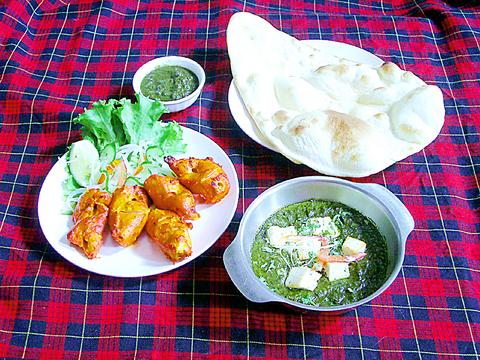New Delhi, with its spacious dining area and high ceilings is something of an exception on crowded Linsen North Road, known more for its cramped Taiwanese-style restaurants. On sunny days light floods in through skylights and big windows. This kind of comfort balances out the higher prices that you can expect to pay here, as compared to other Indian eateries in Taipei.
According to manager Kuo Ching-yuan (

PHOTO: YU SEN-LUN, TAIPEI TIMES
But the food does not make you feel like you're in Taiwan. The Kuo's went to New Delhi where they rented a restaurant kitchen and held exams for chefs. Only four were chosen. "All of them come to Taiwan with their official chef license. They did not come as students or on travel visas," said Kuo, emphasizing the quality of his chefs.
To start, why not have a lassi -- an Indian yogurt drink -- choosing from four different fruit flavors. After that, samosas or masala papad -- crispy naan, chewy like a taco but spiced with Indian masala -- is recommended. And then for grilled meats, try the sheesh kebab, which is minced lamb shaped like a sausage. Chicken tikka is another popular grilled dish which looks similar to tandoori chicken but is made with boneless chicken breasts.
For vegetarians, raeta, which is yogurt mixed with potato, cucumber, onion and tomato, makes an excellent non-fattening salad. Also there are popular dishes such as daal makhani, a black bean curry, and malka masson, made of red lentil beans. There is also a rich tomato soup, which is ideal of vegetarians and which Kuo says also reduces the risk of cancer.
For the main course there is really only one option: curry. Curry at New Delhi is generally rich, not too greasy and not too spicy.
"If you have a plate of curry with a thick layer of oil on top and which tastes very hot, then it's not fresh. It's using oil to reheat the dish and hot peppers to cover the taste of different spices," said Kuo.
For lovers of hot spicy food, New Delhi also offers an Indian hot sauce for NT$150 a portion. The sauce is made of Jamaican chili peppers. It is about twice as hot as what you can expect from an "extra hot" spicy hot pot and should be treated with respect.

That US assistance was a model for Taiwan’s spectacular development success was early recognized by policymakers and analysts. In a report to the US Congress for the fiscal year 1962, former President John F. Kennedy noted Taiwan’s “rapid economic growth,” was “producing a substantial net gain in living.” Kennedy had a stake in Taiwan’s achievements and the US’ official development assistance (ODA) in general: In September 1961, his entreaty to make the 1960s a “decade of development,” and an accompanying proposal for dedicated legislation to this end, had been formalized by congressional passage of the Foreign Assistance Act. Two

Despite the intense sunshine, we were hardly breaking a sweat as we cruised along the flat, dedicated bike lane, well protected from the heat by a canopy of trees. The electric assist on the bikes likely made a difference, too. Far removed from the bustle and noise of the Taichung traffic, we admired the serene rural scenery, making our way over rivers, alongside rice paddies and through pear orchards. Our route for the day covered two bike paths that connect in Fengyuan District (豐原) and are best done together. The Hou-Feng Bike Path (后豐鐵馬道) runs southward from Houli District (后里) while the

March 31 to April 6 On May 13, 1950, National Taiwan University Hospital otolaryngologist Su You-peng (蘇友鵬) was summoned to the director’s office. He thought someone had complained about him practicing the violin at night, but when he entered the room, he knew something was terribly wrong. He saw several burly men who appeared to be government secret agents, and three other resident doctors: internist Hsu Chiang (許強), dermatologist Hu Pao-chen (胡寶珍) and ophthalmologist Hu Hsin-lin (胡鑫麟). They were handcuffed, herded onto two jeeps and taken to the Secrecy Bureau (保密局) for questioning. Su was still in his doctor’s robes at

Mirror mirror on the wall, what’s the fairest Disney live-action remake of them all? Wait, mirror. Hold on a second. Maybe choosing from the likes of Alice in Wonderland (2010), Mulan (2020) and The Lion King (2019) isn’t such a good idea. Mirror, on second thought, what’s on Netflix? Even the most devoted fans would have to acknowledge that these have not been the most illustrious illustrations of Disney magic. At their best (Pete’s Dragon? Cinderella?) they breathe life into old classics that could use a little updating. At their worst, well, blue Will Smith. Given the rapacious rate of remakes in modern